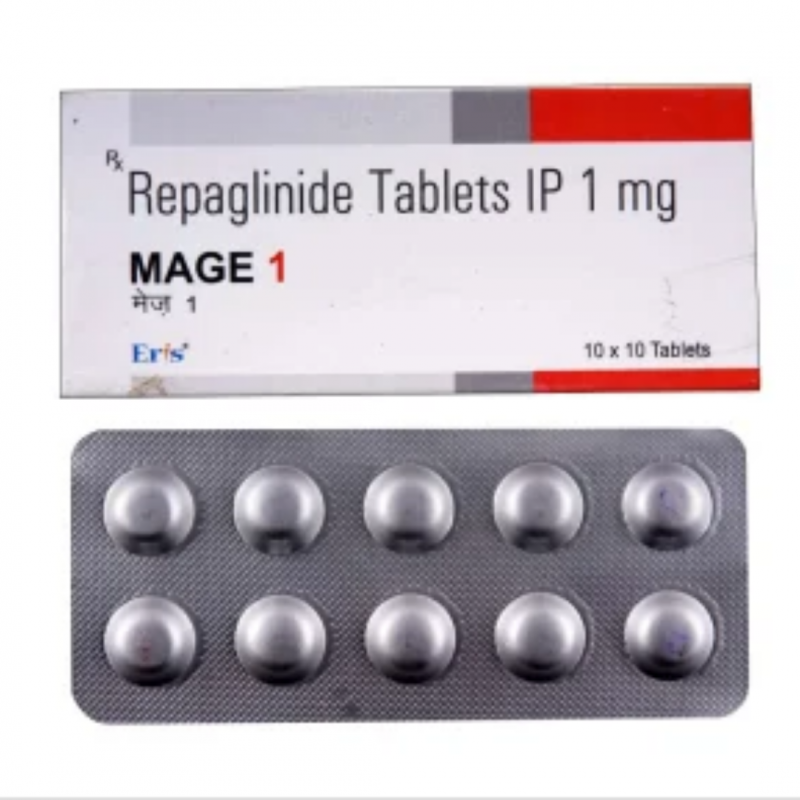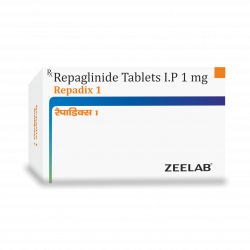Download India's most affordable pharmacy app
- Compare with medicine prices
- Save upto 90% on your medicine bills
COMPOSITION:
Repaglinide (1mg)DESCRIPTION:
Mage 1mg Tablet contains Repaglinide (1mg) as its active ingredient, widely used to manage blood sugar levels in individuals with type 2 diabetes. This medicine is an oral antidiabetic agent that helps prevent complications associated with high blood sugar levels, such as nerve damage, kidney issues, and vision problems. Mage 1mg Tablet is effective when combined with a proper diet and regular exercise routine, making it a reliable choice for better diabetes control.
Uses of Mage 1mg Tablet
Mage 1mg Tablet is primarily used for:
- Managing blood sugar levels in patients with type 2 diabetes.
- Preventing complications arising from uncontrolled diabetes, such as cardiovascular diseases, nerve damage, and kidney dysfunction.
How Mage 1mg Tablet Works
Mage 1mg Tablet works by stimulating the pancreas to produce more insulin in response to meals. Repaglinide, its active ingredient, helps regulate blood sugar levels after eating by ensuring the right amount of insulin is released. This action reduces post-meal sugar spikes effectively.
Benefits of Mage 1mg Tablet
Mage 1mg Tablet offers the following advantages:
- Effectively lowers blood sugar levels in type 2 diabetes.
- Helps reduce the risk of diabetes-related complications.
- Quick action due to rapid insulin secretion stimulation.
- Convenient dosing tailored to meal times.
How to Take Mage 1mg Tablet
Take Mage 1mg Tablet as prescribed by your doctor. Typically, it is taken orally before meals to control post-meal blood sugar levels. Swallow the tablet with a glass of water and do not chew or crush it. The dosage will depend on your medical condition, blood sugar levels, and response to treatment. Do not skip meals after taking the medication.
Side Effects of Mage 1mg Tablet
Common side effects of Mage 1mg Tablet include:
- Low blood sugar levels (hypoglycemia).
- Nausea.
- Headache.
- Stomach upset or diarrhea.
Severe side effects may include:
- Severe hypoglycemia (extremely low blood sugar).
- Allergic reactions like rashes, swelling, or difficulty breathing.
- Liver problems.
Contact your doctor immediately if you experience any severe or persistent symptoms.
Safety Advice
While taking Mage 1mg Tablet, keep the following precautions in mind:
- Inform your doctor about any allergies or other medications you are taking.
- Avoid skipping meals to prevent low blood sugar levels.
- Limit alcohol consumption as it may affect blood sugar control.
- Not recommended for individuals with type 1 diabetes or diabetic ketoacidosis.
- Pregnant or breastfeeding women should consult their doctor before using this medication.
Frequently Asked Questions (FAQs)
Q: What is Mage 1mg Tablet used for?
A: Mage 1mg Tablet is used to manage blood sugar levels in people with type 2 diabetes and prevent complications associated with high blood sugar.
Q: How should I take Mage 1mg Tablet?
A: Take the tablet orally before meals as directed by your doctor. Do not skip meals after taking it.
Q: Can Mage 1mg Tablet cause low blood sugar?
A: Yes, low blood sugar (hypoglycemia) is a common side effect. Always have a quick source of sugar nearby and avoid skipping meals.
Q: Is Mage 1mg Tablet safe during pregnancy?
A: Consult your doctor before using Mage 1mg Tablet during pregnancy or breastfeeding to ensure safety for you and your baby.
Q: Can I consume alcohol while taking Mage 1mg Tablet?
A: It is advisable to limit alcohol consumption as it can interfere with blood sugar control and increase the risk of side effects.








 Added!
Added!